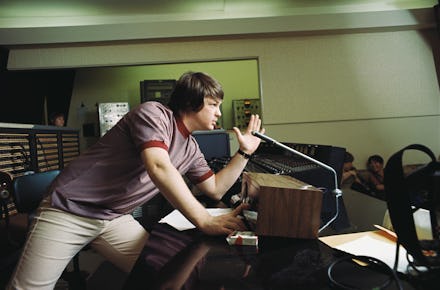50 Years Ago, the Beach Boys Released 'Pet Sounds' and Redefined What a Pop Epic Could Be

"I thought of it as chapel rock." That's how the Beach Boys' lead songwriter Brian Wilson once described the sound he was reaching for on his ornate and exuberant Pet Sounds. "Commercial choir music. I wanted to make an album that would stand up in 10 years."
It has stood for five times that long.
Fifty years ago Monday, the Beach Boys released Pet Sounds, a 36-minute album containing some of the most serenely beautiful and meticulously written pop music the world has ever heard. The long trail of musicians it has inspired through history starts with the Beatles and continues through the Talking Heads. Really, any artist who's attempted a pop concept album is at least partially inspired by Pet Sounds. Lemonade and The Suburbs have debts to pay.
Read more: 50 Years Ago, the Beatles Completed 'Rubber Soul,' the First True Album in Pop History
Yet looking just at its origin story, you might not immediately predict that the album would go down as one of the greatest albums in history — or the second greatest, in Rolling Stone's estimation. It's almost impossible to believe now, but when many people invested in the band heard the music Wilson conceived while attempting to write the world's greatest pop album, they considered it a dud.
Capitol Records, the band's label, hated how far the album's baroque psychedelia strayed from the Beach Boys' bread and butter surf pop. Mike Love, the band's other lead songwriter, dismissed the album's "sad sack" lyrics.
Irony doesn't get much sweeter. History has been exceedingly kind to the album. Without Pet Sounds, music as we know it would be impossibly different, likely far less lush, less adventurous, with stunted senses of harmony and humor.
Pet Sounds was inspired in part by two disparate events Wilson experienced in 1964: a panic attack and a Beatles record. While on a flight to Texas with the band, Wilson collapsed into a screaming, sobbing pile of tears. He had to quit the tour. "But listen," Wilson remembers telling the band at the time, as related in a BBC documentary on the album, "it's going to be well worth it because I'm going to write you some good songs — and I did."
The Beatles' Rubber Soul gave him his blueprint. In 1964, Wilson heard Rubber Soul, and considered it to be the first full pop album with absolutely no filler.
"When we were listening to it that night I said to myself, 'Now I'm gonna make an album just as good as Rubber Soul,'" Wilson once said. "Not the same album. Obviously there can only be one album that's Rubber Soul, just like there can only be one Pet Sounds. But it inspired me to do my own thing, and so the next morning I went to the piano and wrote 'God Only Knows' with Tony Asher."
All the album's standouts — "God Only Knows," "Sloop John B" and "I'm Waiting for the Day" — feature extraordinarily complex instrumentation and musical techniques rare for their time. Wilson experimented with tempo changes, ambiguous meter and unique tone colors, making sure that every slight musical quirk was blessed with meaning.
A quick example so you can see how deep it goes: "You Still Believe in Me" is set in B major, a key rarely used in pop, explains Jim Fusilli's 33 1/3 book on the album. Wilson wrote in two G# major chords once on the word "love" and once on the word "fail." "It's as if Brian wanted there to be no confusion for the listener: In his mind, at least in this song, love equals failure," Fusilli wrote.
Deeper still, these meditations on love and loss are put together with a bizarre set of instruments absolutely unheard-of in rock 'n' roll. Bicycle horns, Coke bottles, accordions, 12-string mandolins, trombones, water jugs — Wilson took this ragtag assortment of preschool and off-beat classic instruments and elevated them to the level of the sublime.
While reflecting on the album's staying power for Pitchfork, electronic musician Daedelus honed in on Wilson's pioneering use of the Tannerin, a Thearmin-like instrument that appears on "I Just Wasn't Made for These Times," and later on the single "Good Vibrations."
"The vision of Brian Wilson!" he said. "The gumption even. It's like he plucked the future from 1966 and invented G-funk and acid house. I'm sure it must have sounded crazy on the radio dial; it certainly did for me."
While the album didn't speak to the label, or a certain "asshole" in the Beach Boys, it has served as inspiration for years of artists. Pet Sounds directly led to another masterpiece two years later, from the same band that blew Wilson's mind in the first place.
"Without Pet Sounds, Sgt. Pepper never would have happened," the Beatles' producer George Martin once claimed. "Pepper was an attempt to equal Pet Sounds."
Once the industry caught on to its genius, Pet Sounds ended up changing so much of how labels interact with their artists, so others could try the same. In a Pitchfork retrospective, Talking Heads' Tina Weymouth credits Wilson's sensitivity and genius with helping labels become more comfortable giving artists space and time to pursue their art. "I don't think Talking Heads would've had the longevity we did if the label didn't have this wonderful view toward artists," Weymouth said.
Pet Sounds made pop weird; it encouraged it to be bold, sophisticated and sensitive. It helped the money side of the industry see the value in what may first appear to be a black sheep album. God only knows what pop would be without the Beach Boys' Pet Sounds. It's one existential question that no one needs answered.